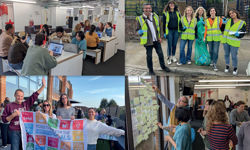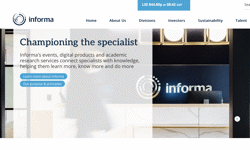
A topic like the future of work needs as much as possible to come back to facts. Here, though, is the only one that matters: unless you are some sort of text-reading technology, you and everyone else reading this article is going to die. Wait. Don’t rush off to the next article. There is good news. You and everyone reading this will, on average, live longer, healthier lives.
As London Business School professors Lynda Gratton and Andrew Scott point out in The 100-Year Life, this will be a gift – provided younger generations in particular can set themselves up to navigate the multiple transitions that will be needed to ensure their finances stretch across a longer period. This is not least because governments will struggle to support pension needs for growing populations and longer healthy life spans.
A three-stage life – school, work, retirement – will break down if it hasn’t already. People will necessarily have to find ways to retrain through a longer working period. Societal change is reshaping how we think about jobs. Prospective employees now care far more about their values and purpose and thus whether any future employer’s culture matches these. Furthermore, technology is driving a more formalised gig economy, increasingly sophisticated automation of underlying tasks and enabling portfolio careers from any location with internet access.
In this context, the global pandemic has served to accelerate trends and forced business leaders to rethink and act.
The prevailing sentiment is not on scrapping offices entirely but rethinking them as hubs for specific activities.
The office as a hub
Speaking in November at the Outsell Signature Event 2020, Gemma Postlethwaite, CEO of digital media company Arizent, said that during early phases of lockdown, engagement and productivity were strong and challenges like onboarding and strategy planning were overcome, but the honeymoon was now over. "We describe it now more often than not as living at work, not working from home," she said. "One thing we've learned is that we may have been celebrating how productive we've been working from home but it is not a very sustainable model. It's taking its toll."
Across a spectrum of information companies, the prevailing sentiment is not on scrapping offices entirely but rethinking them as hubs for specific activities such as training, interviews, onboarding, brainstorming, hands-on workshops and client visits. It may vary by function and demographic but most in the sector I know are gearing up for greater flexibility for employees to divide their time between home and office working as it is what people are asking for. In a poll on LinkedIn by Ryan Holmes, founder and CEO of Hootsuite, only 9% of about 16,000 respondents wanted to work in an office every weekday.
Resulting cost savings from fewer or smaller offices are clearly an attraction. Lance Uggla, CEO at IHS Markit, said on an earnings call: "We can be more efficient by rethinking how we work. We expect this experience to bring permanent changes including more flexibility, reduced office footprint, less travel and increased productivity."
Companies though are on a spectrum. Josh Eastright, CEO at Bloomberg Industry Group, noted at the November event that Bloomberg is being completely flexible with its 20,000 global employees. "At the same time, we believe our offices are fundamental to our culture and how we operate," he said, noting that if anything, Bloomberg is investing in office space. Moves to reimburse commutes, provide breakfast and lunches in offices and upgrade air systems show Bloomberg’s commitment to its offices. “We’re coming back to the offices on the other side of this thing.”
Given the pace of how skillsets are changing, the concept of picking a vocation is an outdated idea.
New career expectations
In the spirit of not wasting a good crisis, though, this is leaders’ chance to explore what their staff would want in the longer term.
With the linear career facing extinction, a multi-stage life will result in early career staff experimenting more (this is why millennials have a reputation for job-hopping; they recognise they will have to), continued development of life-long transition, more frequent job transitions and the development of pluralism through portfolio careers.
Unlike industries such as manufacturing, information companies have greater potential to be flexible on location, supporting career transitions throughout the whole organisation. It’s time to reinforce your thinking on whether your competitive advantage will be to attract and retain top talent or the agility to turnover staff and skills. Based on conversations with various organisations in this sector, my expectation is that it will be the former, requiring a greater focus on output rather than presenteeism, trust over excessive monitoring and a shift in mindset from being an employer to being a work-life sponsor.
Andrew Griffiths, director of digital & community at The Planet Mark, who joined a panel of emerging leaders at the Outsell event encouraged business leaders to study the younger generation to recognise how their organisation’s working practices need to change. "If you were paying attention to what young people were doing through the onset of computing, the internet or social media, how they were using these were very clear signals business needed to not only understand the underlying technology but the cultural shifts that come along with them. The rise of remote working is going to be huge… but sustainability, purpose and inclusion could well be the next big paradigm shift. This is why the younger generation will buy from or work with an organisation. Given by 2025, 75% of the workforce will be Millennial or Gen Z, this has huge implications for where you'll get your fresh waves of graduates from."
Gemma Hitchens, content director at The Financial Times, added: "There is definitely a shift in what a career looks like: some of the jobs that exist now won't have even been jobs when the Class of 2020 started their education. Given the pace of how skillsets are changing, the concept of picking a vocation is an outdated idea. Your role in work is constantly evolving. Continual upskilling is needed and the idea you train, go to work and that's your life set is rapidly changing.”
If established companies don’t offer this support to upskill, prospective employees will find other ways. She noted that some peers in their late 20s /early 30s were far happier to take on the risk of venture capital backed start-ups knowing that established companies represent a fallback option. “At the FT, we’re trying to flip our thinking. Virtual widens the scope of who we can hire. We also look at the skillsets of those who are proactively applying as it’s potentially a signal for what you need.”
It’s often easy to lament change but we have to seek opportunities within it.
Rethinking the future
Ms Hitchens’ greatest concern centres on creativity. Here the younger generation though is encouraging us to not pine for the office, per se, rather rethink for the future. “We’re always searching for how to tell stories in new ways and that can be difficult if virtual ends up with the same people in the same meetings. We need to ensure we find new ways to spark ideas and feed off each other given that humans are social beasts.”
Planet Mark has calculated that every hour a person in the UK doesn’t commute has a £10.32 value to society. “That means this shift is happening and will remain,” Mr Griffiths said. "It’s often easy to lament change but we have to seek opportunities within it. How do we keep ourselves creative? Well, we do innovation and creativity masterclasses. We get together cross functional working groups and bring in different skills sets. We focus on inclusivity as if people don’t look like you, don’t think like you, then they think differently about a problem.”
Within his career (naturally, a portfolio one in which he describes himself as a man of many hats), Mr Griffiths has worked with Disney to deliver creativity workshops to industry giants such as PepsiCo and GlaxoSmithKline using virtual reality (VR) headsets. “VR is a stepping stone to augmented reality. It’ll make you feel you are in the room with people which will be remarkably compelling,” he said. “I believe in a few years, it will be weird to buy a computer or laptop.”
The UBS Future of Humans Report foresees a specialisation of labour, whereby technology must be used for the repetitive and mundane and to deal with complexity at massive scale (which UBS cites as a “relatively untapped technology opportunity”).
For data, information and technology companies, the goal becomes how to marry this with human advantages in creativity, intuition and trust. The global pandemic has acted as a reminder that while sophisticated algorithms have their place, there is need for expert oversight. For example, models used to process US unemployment claims went to 3.3m from a couple of hundred thousand a week before simply breaking down.
If these companies can get this right for themselves, many are then better set to serve customers who are recognising that they cannot simply let models run on autopilot on lag indicators. The leading companies of the future will pay handsomely for real time data, granular data from phones, vehicles, sensors and the internet of things and the support to develop and interpret scenarios for how their financials or other performance metrics would be affected.
There are indisputable facts creating a need to change how we work. Current and future employees of data, information and technology companies are already reacting and so leaders need to develop a clear, forward-thinking plan that balances culture with the financials.
We need to ensure we find new ways to spark ideas and feed off each other given that humans are social beasts.
This article was first published in InPublishing magazine. If you would like to be added to the free mailing list, please register here.










